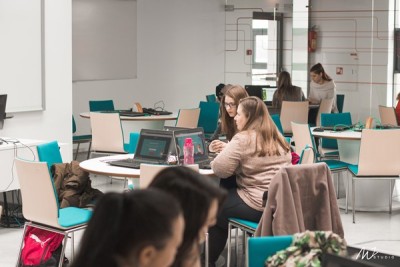On March 13, 2018, the Lithuanian Free Market Institute (LFMI) held Lithuania’s first National Economics Exam for pupils, university students, and everyone interested in measuring their knowledge of economics. Competing in three categories – among school pupils, university students, and citizens – participants were given two hours to complete an online test of 29 multiple choice questions and an open-ended question on the fundamental principles of economics, personal finance, entrepreneurship, and economic policy.
Over 11,000 people from all over the country registered to take the exam, 6,629 of whom completed the test. School pupils (2,903) and general population (2,701) were particularly active in taking the exam. Although according to the Organization for Economic Co-operation and Development and a recent survey by the LFMI, economic literacy in the country is particularly low, the results of the exam show a different picture. On average, participants responded correctly to 18 out of 29 multiple choice questions. 66 participants proved their excellent knowledge of economics by answering successfully all questions.
 The tasks were of practical nature, designed to encourage critical thinking and problem solving instead of measuring purely theoretical knowledge. Participants found it most difficult to answer a question on taking a loan at a negative interest rate. The least problematic was explaining changes in consumer behavior due to price increases. A panel of Lithuania’s renowned economists will evaluate the answers to the open-ended question of the best participants and invite the best of the best to an award ceremony in the Ministry of Education and Science, where they will be awarded monetary and special prizes, as well as receive LFMI’s textbooks Economics in 31 Hours.
The tasks were of practical nature, designed to encourage critical thinking and problem solving instead of measuring purely theoretical knowledge. Participants found it most difficult to answer a question on taking a loan at a negative interest rate. The least problematic was explaining changes in consumer behavior due to price increases. A panel of Lithuania’s renowned economists will evaluate the answers to the open-ended question of the best participants and invite the best of the best to an award ceremony in the Ministry of Education and Science, where they will be awarded monetary and special prizes, as well as receive LFMI’s textbooks Economics in 31 Hours.
To hold a nation-wide exam, the Lithuanian Free Market Institute partnered with the Lithuanian National Radio and Television, the leading news portal delfi.lt, the Ministry of Education and Science, Lithuania’s leading universities, educational institutions, school teachers, economists, and a dozen of business companies, all aware of the importance of economic literacy and eager to address the issue of underdeveloped economics education.



